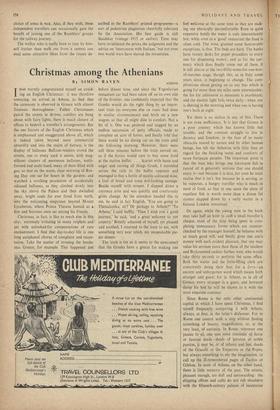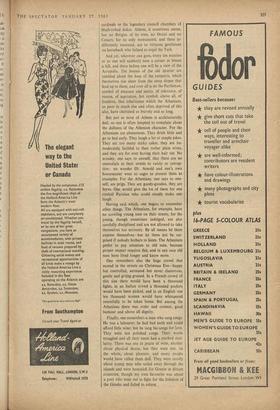Christmas among the Athenians
By SIMON RAVEN
ATHENS
T HAD warmly congratulated myself on avoid- ', ing an English Christmas: it was therefore annoying, on arrival in Athens, to find that the ceremony is observed in Greece with almost Teutonic thoroughness: Father Christmases patrol the streets in droves, conifers are hung about with fairy lights, there is much closure of offices to bedevil a traveller's arrangements. But the one feature of the English Christmas which is emphasised and exaggerated above all, which ip indeed taken beyond mere commercial absurdity and into the realm of fantasy, is the display of balloons. Balloon-vendors crowd the streets, one to every yard it seems, with mag- nificent clusters of enormous balloons, multi- formed and multi-hued, many of them filled with gas; so that on the warm, clear morning of Box- ing Day one sat for hours in the gardens and watched a soothing procession of accidentally released balloons, as they climbed slowly into the sky above the Palace and then dwindled away, bright souls for ever freed from earth, into the welcoming empyrean beyond Mount Lycabettus, where Prince Theseus hunted as a boy and Socrates once sat among his friends.
Christmas, in fact, is like so much else in this city: extremely irritating in many respects and yet with unlooked-for compensations of rare enchantment. I find that day-to-day life is one long antiphonal chorus of complaint and recan- tation. Take the matter of crossing the border into Greece, for example. This happened just before dinner time, and since the Yugoslavian restaurant car had been taken off on its own side of the frontier, one confidently expected that the Greeks would do the right thing by an impor- tant train (as everyone else en route had done in similar circumstances) and hitch on a new wagon, so that all might dine in comfort. Not a bit of it. One was pestered and nagged by an endless succession of petty officials, made to complete an acre of forms, and finally told that there would be no dining car on the train until the following morning. However, there were still three minutes before the •train moved on; so if the kyrios would care to buy some food at the station buffet. . . . Scarlet with haste and anger and cursing all things Greek, I stumbled across the rails to the buffet opposite and managed to buy a bottle of nastily-coloured wine, a loaf of bread and some evil-looking sausage. Beside myself with temper, I slapped down a currency note and was quickly and courteously given change. As the attendant handed this to me, he said in fair English, 'You are going to Thessalonika, sir? Or perhaps to Athens?' To Athens,' I said huffily. 'Then I wish you a good journey,' he said, 'and a great welcome to our country.' Bitterly ashamed of myself, yet pleased and soothed, I returned to the train to eat, with something very near relish, my unspeakable pic- nic dinner.
The truth is (or so it seems to the newcomer) that the Greeks have a genius for making one feel welcome at the same time as they are mak- ing one physically uncomfortable. Even in quite expensive hotels the water is only intermittently hot; while even in a 'good' restaurant the food is often cold. The wine, granted some honourable exceptions, is thin. The beds are hard. The banks have twenty desks for paper procedure to every one for dispensing money; and as for the cur- rency which does finally come out of them, it is still almost at the two-filthy-notes-for-one-box- of-matches stage, though this, as in Italy some years since, is beginning to change. The com- plications about getting on to any bus which is going for more than ten miles seem interminable; the fee for admission to museums is exorbitant; and the electric light fails twice daily—when one is shaving in the morning and when one is having one's bath at night.
Yet there is no malice in any of this. There is not even inefficiency. It is just that Greece is a poor country which has known little but trouble; and the constant struggle to live in decency and freedom, in the face of so many obstacles reared by nature and by other human beings, has left the Athenian with little time or regard for the finicking tastes and comforts of more fortunate peoples. The important point is that the man who brings one lukewarm fish in rancid oil is genuinely anxious that one should enjoy it—not because it is nice, for even he must realise that it isn't, but because he is serving, as he supposes, a hungry traveller who is much in need of food; so that in one sense the plate of repellent fish is worth more than a dozen fat oysters slapped down by a surly waiter in a famous London restaurant.
Or again, while the young man in the bank may take half an hour to cash a small traveller's cheque, most of the time being spent in com- pleting unnecessary forms which are counter- checked by the manager himself, he behaves with so much good will, and finally gives one one's money with such evident pleasure, that one may value his services more than those of the insolent and Brylcreemed cashier farther west, who would take thirty seconds to perform the same office. Both the waiter and the form-filling clerk are consciously doing their best for a eevos—an ancient and unforgotten word which means both stranger and guest; for in Athens, as in all of Greece, every stranger is a guest, and however damp his bed he will be shown to it with the most exquisite courtesy.
Since Rome is the only other continental capital in which I have spent Christmas, I find myself frequently comparing it with Athens, always, at first, in the latter's disfavour. For in Rome one cannot walk a step without finding something of beauty, magnificence, or, at the very least, of curiosity. In Rome, wherever one pauses to' sit, one sees some reminder of fierce or famous deeds—deeds of heroism or noble passion, it may be, or of infamy and lust, deeds of the Gracchi or the Emperors or the Popes, but always something to stir the imagination, to call up the ill-remembered pages of Tacitus or Gibbon. In most of Athens, on the other hand, there is little memory of the past. The streets, pleasant enough, are dull and unrewarding: the shipping offices and cafes do not rub shoulders with the fifteenth-century palaces of incestuous cardinals or the legendary council chambers of black-robed dukes. Athens, it sometimes seems. has no Borgias of its own, no Orsini and no Cresars; for its only monuments, and these in- differently executed, aye to virtuous gentlemen on horseback who helped to expel the Turk.
And yet, wherever one goes, every ten minutes or so one will suddenly turn a corner or breast a hill, and there before one will be a view of the Acropolis. The houses of the old quarter are tumbled about the base of the ramparts, which themselves rise sheer from the steep slopes that lead up to them; and over all is set the Parthenon, symbol of measure and sanity, of tolerance, of reason, of aspiration, but symbol, above all, of freedom, that inheritance which the Athenians, so poor in much else and often deprived of this also, have cherished so bravely and so long.
But just as most of Athens is architecturally dull, so one is often tempted to complain about the dullness of the Athenian character. For the Athenians are abstemious. They drink little and go to bed early. They laugh a lot at simple jokes. They eat too many sticky cakes, they are im- moderately faithful to their rather plain wives, and they are for ever having their hair cut. No wonder, one says to oneself, that there are no memorials in their streets to vanity or corrup- tion: no wonder Dr. Arnold and one's own housemaster were so eager to present them as examples. For the Athenians, one says to one- self, are prigs. They are goody-goodies, they arc bores. One would give the lot of them for one cynical Parisian who could simply make one laugh.
Having said which, one begins to remember other things. The Athenians, for example, have no scowling young men on their streets; for the young, though sometimes indulged, are also carefully disciplined and are not allowed to take themselves too seriously. By all means let them express themselves--but let them not be sur- prised if nobody bothers to listen. The Athenians prefer to pay attention to old men, because proper respect requires this, and in any case old men have lived longer and know more.
One remembers also the huge crowd that moved in the streets on Christmas Eve—happy but controlled, animated but never clamorous, gentle and giving ground. In a French crowd of this size there would have been a thousand fights, in an Italian crowd a thousand pockets would have been picked, and in an English one ten thousand women would have whimpered resentfully to be taken home. But among the Athenians there was order and content, good humour and above all dignity.
Finally, one remembers a man who sang songs. He was a labourer; he had bad teeth and could afford little wine; but he sang his songs for love. They were not polished songs. Their words straggled and all their tunes had a marked simi- larity. There was one in praise of wine, another about physical desire, but they were not, on the whole, about pleasure, and many people would have called them dull. They were mostly about young men who sailed away through the islands and were homesick for Greece in distant countries; though my own favourite was about a poet who went out to fight for the fre'edom of the Greeks and failed to return.











































 Previous page
Previous page